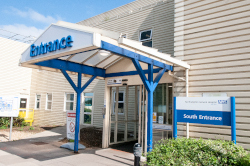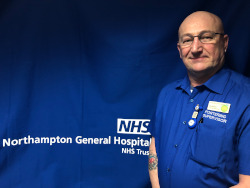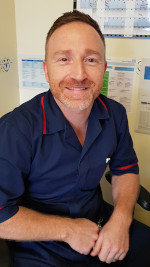Why a career in the NHS is ideal for former military personnel
Category: Job Finding
Publish date: 07/01/2020

NHS Trusts in Northamptonshire are encouraging former military personnel to consider a role in the NHS to support their transition back into civilian life.
One former military man enjoying working at Northampton General Hospital NHS Trust is 57-year-old Ian Barker, who is a Portering Supervisor.
Ian was a Chef in the Royal Navy. He is originally from Northampton, but after leaving the Navy, he settled in Norwich, before moving back to Northampton after his wife died in 2007.
When he first left the Navy, Ian did a variety of roles, but when he returned to Northampton, he took a three-month contract at Northampton General Hospital as a domestic to undertake a deep clean of the hospital.

While working at the hospital, he applied for role and secured a job as a full-time porter in the Accident and Emergency department and he has now worked at Northampton General Hospital for 12 years.
Ian says working in the NHS is ideal for someone coming out of the armed forces. He explains, “The NHS is very similar in structure to the military service, with a hierarchy of senior staff and lots of people on the frontline. Working in the NHS can make the transition from military life to civilian life more straightforward, as the way work is organised is quite familiar.”
Ian is an out of hour’s supervisor. There are 80 porters in the department working on a rota basis. At night after 5pm the team is reduced to just seven, which Ian supervises. He works shifts on a three-shift system including weekends and ensures the porters are in the right place, at the right time, doing their job correctly.
Ian’s experience of working at Northampton General Hospital has been extremely positive. He has been supported by his managers to undertake additional training. He has completed a leadership and management course and is keen to progress into a managerial role.
Ian is also an Armed Forces Champion. He connects with patients who may have been in the armed forces and encourages those who have done military service to take on roles in the NHS.
Ian says, “My experience in the Navy enables me to connect with other veterans and help them out if they need additional support. I don’t force this but if people want to talk, then I’m here for them.”
Ian recommends working at the NHS for ex-military personnel and believes the NHS could do more to connect with the military and offer roles to people who are coming out.
He adds, “It’s a working environment that ex-forces people fit into well. People that have worked in the military have a great deal of skills and experiences and can be of huge value to the NHS. I love working here and I wouldn’t want to be working anywhere else.”
Another former military man who is now working at Kettering General Hospital is 44 year old Rob Barritt.
Rob was a Class 1 Combat Medical Technician in the British army and is trained in battlefield advanced trauma life support. He left the army in 2003 and went on to do a diploma to become an Operating Departmental Practitioner (ODP) at Leicester University.
This role is a vital part of the operating theatre team, working with surgeons and anaesthetists to provide a high standard of care to patients. After completing his diploma, Rob worked for nine years as a self-employed locum around various Trusts in Northamptonshire and Leicestershire, before joining Kettering General three years ago.
Rob explains, “After working for myself for many years I was keen to become part of a team again. Being self-employed can be isolating and although I was working at various Trusts, I never felt part of a team. The role at Kettering General Hospital offered me good career prospects in the long term and the chance to feel part of an organisation again.”
Since joining Kettering, Rob has been promoted to a Band 8 Theatre Matron and is responsible for quality, improving standards of clinical care and staffing at the hospital’s operating theatres. He manages 163 staff, which includes a few ex-military people.
Rob says the NHS is a good place for military people to work, especially those who have trained as a medic. He is keen to highlight that for his role there are now two routes in, an apprenticeship route and a degree route, which provides more options for people.
He explains, “To become an ODP you can enrol on BSc (Hons) Operating Department Practice through university or via an apprenticeship route. The apprenticeship is ideal if you are employed as a healthcare worker and your employer is willing to support your professional development. The hospital offers opportunities for all types of people and is keen to recruit people from military backgrounds.”
Rob highlights there are differences between working at the NHS and in the military, but he is keen to encourage more military personnel to consider a career in the NHS. He says the skills people leave the military with are very adaptable to working in a healthcare environment.
Rob explains, “The military is very process driven and you always know what you are doing and when. The NHS however, can be quite different as you are dealing with patients and every day can be different. This is part of its appeal and I really enjoy the clinical aspect of my job.
“I’d highly recommend a career at the NHS. There is such a variety of roles available, both clinical and non-clinical that there is likely to be something to suit most people. The skills ex-military people have such as their commitment and punctuality, along with their experience working in the military is of huge value to the NHS.”” Rebecca Bell who is HR Manager, Workforce Planning at Kettering General Hospital concludes, “The NHS needs people and ex-forces need jobs and to fit back into society. Working at the NHS can offer people a great second career after leaving the forces. We encourage ex-forces to have a look at the wide variety of roles that are available and apply.”
Ruth Smith, Quality Improvement Adviser at Northampton General Hospital said, “We are extremely proud to be accredited by GIRFT as a Veteran Aware Trust and signatories of the Armed Forces County Covenant. We signpost veterans, their families and carers (both staff and patients) to the local support services available should they wish to access them. We also have a growing team of Armed Forces Champions across the Trust providing a network of support, several of whom are veterans themselves. We deeply value those who have served our country and as a Trust, welcome all the transferable skills and knowledge service personnel can bring to our workforce”
Search for Northamptonshire Healthcare Vacancies on RightJob - 283154